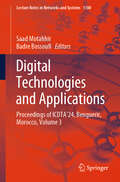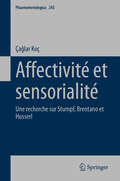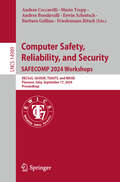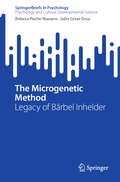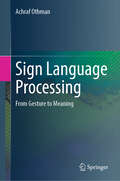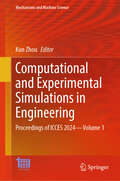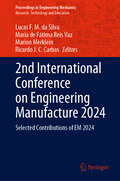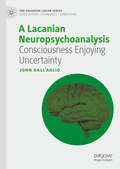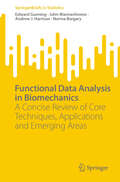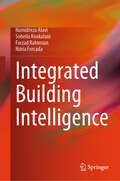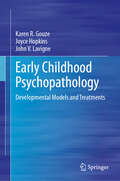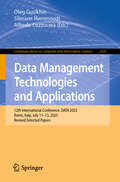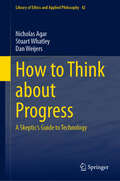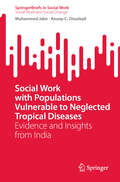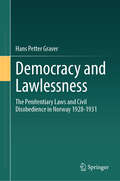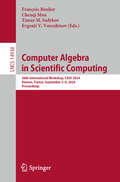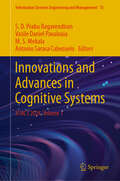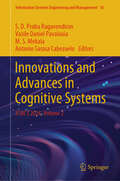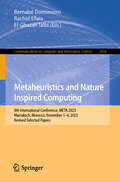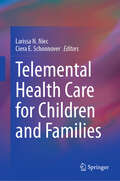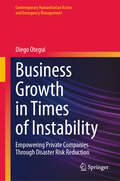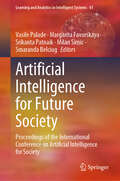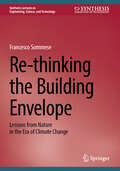- Table View
- List View
Digital Technologies and Applications: Proceedings of ICDTA'24, Benguerir, Morocco, Volume 3 (Lecture Notes in Networks and Systems #1100)
by Saad Motahhir Badre BossoufiThis book presents volume 3 of selected research papers presented at the fourth International Conference on Digital Technologies and Applications (ICDTA’24). Highlighting the latest innovations in digital technologies as: artificial intelligence, Internet of Things, embedded systems, chatbot, network technology, digital transformation and their applications in several areas as Industry 4.0, sustainability, energy transition, and healthcare, the book encourages and inspires researchers, industry professionals, and policymakers to put these methods into practice.
Affectivité et sensorialité: Une recherche sur Stumpf, Brentano et Husserl (Phaenomenologica #243)
by Çağlar KoçThis book deals with the works of three philosophers: Carl Stumpf, Franz Brentano, and Edmund Husserl. It focuses on texts that concern affectivity, valuation, and classification of feelings. The author's interest is particularly centered on sensory feelings. Taking as a common thread the experience of pain and the case of masochism, the author attempts to put forward an original problem, with the help of which he succeeds in showing the advantages of Husserl's position concerning sensory feelings in relation to the positions of Stumpf and Brentano. The study aims to bring phenomenology and descriptive psychology into dialogue with the philosophy of mind as well as with contemporary debates on pain and pleasure in the philosophy of emotions. However, the purpose of this study is not only to inquire about sensory feelings. The more general task is to bring to light the structure of affective consciousness according to the three philosophers. The originality of this book lies in the fact that it seeks to reach the subtle differences between our feelings on the basis of an affective phenomenology, of Husserlian inspiration. It presents a new exegesis of Husserl's manuscripts on feelings and appeals to researchers and students in the field.
Computer Safety, Reliability, and Security. SAFECOMP 2024 Workshops: DECSoS, SASSUR, TOASTS, and WAISE, Florence, Italy, September 17, 2024, Proceedings (Lecture Notes in Computer Science #14989)
by Friedemann Bitsch Erwin Schoitsch Andrea Bondavalli Barbara Gallina Andrea Ceccarelli Mario TrappThis book constitutes the proceedings of the Workshops held in conjunction with the 43rd International Conference on Computer Safety, Reliability, and Security, SAFECOMP 2024, which took place in Florence, Italy, during September 2024. The 36 papers included in this book were carefully reviewed and selected from a total of 64 submissions to the following workshops: DECSoS 2024 – 19th Workshop on Dependable Smart Embedded and Cyber-Physical Systems and Systems-of-Systems SASSUR 2024 - 11th International Workshop on Next Generation of System Assurance Approaches for Critical Systems TOASTS 2024 – Towards A Safer Systems’ Architecture Through Security WAISE 2024 – 7th International Workshop on Artificial Intelligence Safety Engineering
The Microgenetic Method: Legacy of Bärbel Inhelder (SpringerBriefs in Psychology)
by Rebeca Puche-Navarro Julio César OssaOne of the arguments that explain the relevance of this book is the overwhelming lack of knowledge that the current literature throws on the Inhelderian microgenetic method. The place of this method is definitely ungrateful and has remained incomprehensibly hidden. All indications are that it seems to have lagged behind many of the brightest heads in developmental psychology, those who made up the Geneva school. The book aims to illustrate how Inhelderian microgenesis emerges in the landscape of cognitive development as a new object of study. More than ruptures with respect to the problems of the normative subject, the Inhelderian project entails both conceptual and methodological displacements. In this new map, the psychological subject takes a predominant place, and does so in terms of the cognitive functioning of the subject in relation to situations of resolution. This functioning is studied on the basis of the microgenetic method, which makes it possible to identify the role of mental schemas, their combinations and recompositions in the face of specific and problematic situations. The totally original version of the microgenetic method that is delivered from the Inhelderian legacy in this book, not only recovers its basic sense but also advances in the direction of some indications that Inhelder herself had pointed out. This renewed object of study recovers a subject, with a status in terms of its own models, its theories and its dynamics. Starting from a demanding and knowledgeable reading of Inhelder's work. This knowledge becomes the best criterion to point out an updated path of the work with concepts and tools resulting from recent research but articulated with a microgenetic vision coming from the most orthodox tradition. The bet consists of advancing from the legacy of Inhelder and her team and projecting it as a methodological alternative for current research in developmental studies.
Sign Language Processing: From Gesture to Meaning
by Achraf OthmanIn a world where communication is key to human connection, understanding, and learning from one another, the book investigates the rich and intricate world of sign languages, highlighting the fascinating complexities of visual-spatial languages and their unique role in bridging the gap between hearing and deaf communities through information and communication technology. The book takes a journey through the evolution of sign language processing tools while exploring the cutting-edge techniques used to decipher, analyze, and process them, from the fundamentals of sign language structure and the nuances of non-manual signals to the latest developments in computational linguistics (corpora design, annotation tools, and notation systems), sign language recognition, and machine/deep learning applications. With a mission to reveal the silent language of expression, the author provides a captivating and thought-provoking look into a world often overlooked yet teeming with life and meaning. Offering a comprehensive and engaging overview of the current state of sign language research as well as its prospects, this monograph is an introduction resource for computer scientists, linguistics, educators, academics and sign language interpreters alike. This monograph is an invitation to discover the incredible potential of sign languages to transform human communication, promote inclusivity, and shape the future of technology. The readers will gain a deeper appreciation of the beauty and complexity of sign languages through technology, and they will be inspired to embrace the power of visual communication in our increasingly diverse and interconnected world.
Computational and Experimental Simulations in Engineering: Proceedings of ICCES 2024—Volume 1 (Mechanisms and Machine Science #168)
by Kun ZhouThis book gathers the latest advances, innovations, and applications in the field of computational engineering, as presented by leading international researchers and engineers at the 30th International Conference on Computational & Experimental Engineering and Sciences (ICCES), held in Singapore on August 3-6, 2024. ICCES covers all aspects of applied sciences and engineering: theoretical, analytical, computational, and experimental studies and solutions of problems in the physical, chemical, biological, mechanical, electrical, and mathematical sciences. As such, the book discusses highly diverse topics, including composites; bioengineering & biomechanics; geotechnical engineering; offshore & arctic engineering; multi-scale & multi-physics fluid engineering; structural integrity & longevity; materials design & simulation; and computer modeling methods in engineering. The contributions, which were selected by means of a rigorous international peer-review process, highlight numerous exciting ideas that will spur novel research directions and foster multidisciplinary collaborations.
2nd International Conference on Engineering Manufacture 2024: Selected Contributions of EM 2024 (Proceedings in Engineering Mechanics)
by Lucas F. M. da Silva Marion Merklein Maria de Fátima Reis Vaz Ricardo J. C. CarbasThis book gathers selected papers presented at the 2nd International Conference on Engineering Manufacture, held in Porto, Portugal, May 9–10, 2024. The focus is on engineering manufacture and includes works on additive manufacturing, heat treatment, rolling, joining and fatigue. The book provides the state-of-the-art of engineering manufacture and also serves as a reference volume for researchers and graduate students working in the field of technological processes.
A Lacanian Neuropsychoanalysis: Consciousness Enjoying Uncertainty (The Palgrave Lacan Series)
by John Dall’AglioThis book brings together Lacanian psychoanalysis, neuropsychoanalytic work by Mark Solms and Ariane Bazan, Jaak Panksepp’s affective neuroscience, Karl Friston’s free energy principle, Adrian Johnston’s transcendental materialist philosophy, and Darian Leader’s critique of jouissance in Lacanian theory. In doing so, it articulates a philosophical and scientific basis for Lacanian neuropsychoanalysis. A Lacanian perspective on Solms’s recent neuropsychoanalytic developments in affective consciousness and predictive coding furnishes an immanent critique that advances both Lacanian psychoanalysis and neuropsychoanalysis. Dall’Aglio develops novel propositions for conceptualizing the Lacanian real, symbolic, and imaginary registers in the brain, treating affect systems like signifiers, viewing jouissance as surplus prediction error, and conceiving the brain as structurally antagonistic. It presents fresh theoretical and clinical insights in a manner that will be accessible to the interdisciplinary fields it draws upon. It will appeal to those working in neuropsychoanalysis, clinical psychology, neuroscience, psychoanalysis, and critical theory.
Functional Data Analysis in Biomechanics: A Concise Review of Core Techniques, Applications and Emerging Areas (SpringerBriefs in Statistics)
by Edward Gunning John Warmenhoven Andrew J. Harrison Norma BargaryThis book provides a concise discussion of fundamental functional data analysis (FDA) techniques for analysing biomechanical data, along with an up-to-date review of their applications. The core of the book covers smoothing, registration, visualisation, functional principal components analysis and functional regression, framed in the context of the challenges posed by biomechanical data and accompanied by an extensive case study and reproducible examples using R. This book proposes future directions based on recently published methodological advancements in FDA and emerging sources of data in biomechanics. This is a vibrant research area, at the intersection of applied statistics, or more generally, data science, and biomechanics and human movement research. This book serves as both a contextual literature review of FDA applications in biomechanics and as an introduction to FDA techniques for applied researchers. In particular, it provides a valuable resource for biomechanics researchers seeking to broaden or deepen their FDA knowledge.
Integrated Building Intelligence
by Hamidreza Alavi Soheila Kookalani Farzad Rahimian Núria ForcadaThis book integrates of Building Information Modeling (BIM) and Decision Support Systems (DSS) in the field of building design, construction, and maintenance. The book explores how BIM and DSS technologies can be synergistically utilized to enhance performance, comfort, and maintenance efficiency in buildings. With an emphasis on practical applications, the book provides a comprehensive overview of the latest advancements in BIM and DSS, including real-world case studies and implementation guidelines. The book features illustrations, tables, and examples that aid in understanding complex concepts and demonstrate the practical application of BIM and DSS in building projects. Readers will gain a deep understanding of how BIM and DSS can be integrated to optimize building design, streamline construction processes, and improve facility management and maintenance. The main benefit of reading this book is that it provides a valuable resource for professionals in the architecture, engineering, and construction industries who want to leverage the power of BIM and DSS to enhance their building projects. Additionally, the book explores how BIM and DSS can contribute to energy efficiency.
Early Childhood Psychopathology: Developmental Models and Treatments
by Karen R. Gouze Joyce Hopkins John V. LavigneThis book examines psychosocial risk factors contributing to the development and maintenance of psychopathology in early childhood. It draws on developmental psychopathology theory and research to discuss different approaches to the classification of early childhood emotional and behavioral disorders, address the importance of multidomain approaches to understanding risk factors for specific diagnoses, and examine the movement toward transdiagnostic conceptualizations. The book describes how multidomain models of risk factors can be integrated with transdiagnostic approaches to illuminate the development of general psychopathology, internalizing and externalizing symptoms, and singular symptom clusters of the most common early childhood disorders, including oppositional disorders, ADHD, anxiety, and depression. In addition, the volume highlights the implications of this approach for clinical treatment, training of child clinicians, and the development of public policy. Key areas of coverage include: A developmental psychopathology approach to early childhood mental health disorders and the development of multi-domain models of risk factors. Risk factors contributing to the development and maintenance of emotional and behavioral symptoms in early childhood. Transdiagnostic approaches and risk factors for general psychopathology as well as specific types of symptoms. Current treatments for disorders in early childhood and a novel integrative approach to treatment based on research findings. Training of child clinicians and social policy implications derived from the research program detailed in the book. Early Childhood Psychopathology is an essential resource for researchers, clinicians, scientist-practitioners, and graduate students in such fields as developmental, clinical child, and school psychology, child and adolescent psychiatry, social work, family studies, early childhood education, and all related disciplines.
Data Management Technologies and Applications: 12th International Conference, DATA 2023, Rome, Italy, July 11–13, 2023, Revised Selected Papers (Communications in Computer and Information Science #2105)
by Alfredo Cuzzocrea Slimane Hammoudi Oleg GusikhinThis book constitutes the proceedings of the 12th International Conference on Data Management Technologies and Applications, DATA 2023 , held in Rome,Italy during July 11–13, 2023, Proceedings. The 6 full paper were carefully reviewed and selected from 106 submissions. The papers are organized in subject areas as follows: Big Data Applications, Data Analytics, Data Science, NoSQL Databases, Social Data Analytics, Dimensional Modelling, Deep Learning and Big Data, Decision Support Systems, Data Warehouse Management and Data Management for Analytics.
How to Think about Progress: A Skeptic's Guide to Technology (Library of Ethics and Applied Philosophy #42)
by Nicholas Agar Stuart Whatley Dan WeijersHow to Think about Progress is an interdisciplinary work exploring whether optimistic claims about technology’s potential stand up to humanity’s most difficult challenges. Will technology solve the problems of climate change, pandemics, cancer, loneliness, unhappiness, and even death? The authors show that techno-hype is all too often accepted because of the horizon bias, i.e. the modern propensity to believe that any problem that can be solved with technology will be solved in the very near future. The authors situate their analysis in a broad context, drawing on history, literature, and popular culture to emphasize their case against techno-hype. They also draw on a wide range of research, including that of biologists, philosophers of science and of language, psychologists, theorists of technological change, specialists on digital technologies, historians of ideas, and economists. As a corrective to much mainstream “futurism,” the book offers principles for seeing through much of the techno-hype that circulates online and in best-selling books. The authors share insights (without the jargon) from a variety of academic disciplines, making this book an engaging read for all audiences. Readers will find a balanced framework for thinking and writing about technological progress in the face of truly vexing challenges like cancer, climate change, and colonizing mars.
Guide to Framing Design Practice for UX (Synthesis Lectures on Human-Centered Informatics)
by John LongThe scope of the book is UX. It presents a comprehensive guide for readers to better engage with the framing of UX design practice. The guide characterises UX as a movement, whose members are developing shared ideas to specify and to implement HCI (Human-Computer Interaction) as UX. The book is based on the analysis of the conduct and reporting of framing UX design practice, contributed by experienced UX practitioners. It surveys the various means by which UX practitioners conduct and report their design practices. These include trial and error; implement, test, and specify; and implement, evaluate, and iterate. These practices apply UX frameworks, UX approaches, and UX methods and are typically reported in the form of UX case studies. The book differs from top-down, formal, and framework-driven approaches. In contrast, it takes a bottom-up, informal, and practice-driven approach. In a dynamic field such as UX, there is seldom time to stop and think about the wider issues associated with design practice and its related trends. But this book creates that opportunity for UX practitioners to locate and reflect on their design practice—what they are doing and why they are doing it. The guide creates a space in which UX practitioners are informed of current trends that they can incorporate into their own workflows. Readers benefiting from this book include those working in customer experience design, experience-centred design, and human experience design. It will also be of interest to undergraduate and graduate students trying to make sense of the different ways of conducting and reporting HCI as UX. Further, it provides grounding for young researchers making their way in the fast developing world of UX.
Social Work with Populations Vulnerable to Neglected Tropical Diseases: Evidence and Insights from India (SpringerBriefs in Social Work)
by Muhammed Jabir Anoop C. ChoolayilThis book discusses the need to establish social work for Neglected Tropical Diseases (NTDs) with an emphasis on the emerging role of effective and sustainable social interventions for the control and elimination of NTDs. NTDs are a group of infectious diseases prevalent in tropical and subtropical regions, causing significant morbidity and mortality to the world's poorest populations but receiving relatively lesser attention. They significantly affect communities with poor financial resources, inadequate sanitation and limited healthcare facilities, indicating their social dimension. Addressing NTDs requires multifaceted strategies that consider environmental, social, and economic factors, with socioeconomic factors emerging as a critical determinant. The global battle against NTDs has seen significant progress, yet social workers’ involvement remains limited, particularly in high-prevalence regions like India. This stems from undefined roles and a lack of focus within existing NTD frameworks. Integrating social work into NTD intervention is crucial for addressing the diverse challenges associated with these diseases, especially the social dimensions. Social workers, by advocating for health equity, engaging communities, addressing social determinants, and collaborating with healthcare professionals, can contribute significantly to the broader efforts in mitigating the impact of NTDs on vulnerable populations. This book builds on the social nature of NTDs to argue for the case of NTD social work. Establishing NTD social work requires efforts in training, standardising practices, research, advocacy, infrastructure development, and partnerships. Among the topics covered: Neglected Tropical Diseases: A Brief Introduction to the Global Scenario Neglected Tropical Diseases and the Social Dimension of Illness in India Social Work for the Control and Elimination of Neglected Tropical Diseases Towards Sustainable Impact: Future Directions in Social Work for NTD Control and Elimination Social Work with Populations Vulnerable to Neglected Tropical Diseases helps readers to understand the intersectional nature of health inequities and effectively work towards the control and elimination of diseases of poverty, specifically NTDs. The book is useful reading for health social workers, social work educators, healthcare professionals, medical and public health educators, and public policy and health policy researchers.
Democracy and Lawlessness: The Penitentiary Laws and Civil Disobedience in Norway 1928-1931
by Hans Petter GraverThe book addresses efforts to politically influence and curb the judicial system, by telling the story of the enactment of controversial laws in Norway in 1927. It draws parallels to current challenges to the autonomy of the legal order, both in countries where populist forces seek control over the courts, and in other countries where increasing levels of conflict, such as around the climate crisis and the pandemic, challenge the rule of law. In 1927 the Norwegian Parliament enacted three laws that changes the rules of the game in the relation between Labor and Capital. The law was weaponized in benefit of the employers. By this, the legislature departed from the classic ideal of equality before the law and law’s autonomy as a neutral order. The new laws were called the penitentiary laws. The demonstrations against one of the laws, the Arbitration Act in 1928 were the largest manifestation of civil disobedience in Norwegian history. They provoked a level of lawlessness that has not been matched, with exception of the situation during the German occupation 1940-1945. The book analyses the events with the aid of the theory of civil disobedience in liberal democracies put forward by the philosopher John Rawls and the theory of the legal complex developed by the socio-legal scholars Terence Halliday, Lucien Karpic, and Malcolm Feeley. This book tells the story of the Penitentiary Laws, how the laws came into being, how they were received and resisted, and how they were defeated through civil disobedience and with the support of a legal complex which reached far into the legal system. The outcome of the conflict may be one of the factors that explain the high level of trust that the legal institutions enjoy in present day Norway.
Computer Algebra in Scientific Computing: 26th International Workshop, CASC 2024, Rennes, France, September 2–6, 2024, Proceedings (Lecture Notes in Computer Science #14938)
by Evgenii V. Vorozhtsov Timur M. Sadykov François Boulier Chenqi MouThis book constitutes the refereed proceedings of the 26th International Workshop on Computer Algebra in Scientific Computing, CASC 2024, which took place in Rennes, France, during September 2 - September 6, 2024. The 19 full papers included in this book were carefully reviewed and selected from 23 submissions. The annual International Workshop CASC 2024 aims to bring together researchers in theoretical computer algebra (CA), engineers, scholars, as well as other allied professionals applying CA tools for solving problems in industry and in various branches of scientific computing to explore and discuss advancements, challenges, and innovations related to CA.
Advances in National Brand and Private Label Marketing: 11th International Conference, Oxford, UK, 2024 (Springer Proceedings in Business and Economics)
by Juan Carlos Gázquez-Abad Nicoletta Occhiocupo José Luis Ruiz-RealThe 2024 International Conference on National Brand & Private Label Marketing is a unique academic forum to present and discuss original, rigorous, and significant contributions from researchers around the world on marketing issues facing retailers, store brand managers and national brand managers. The three-day event covered a wide range of topics from varied fields including retailing, marketing, general business, psychology, economics, and statistics. The conference addressed diverse areas of application such as customer journey, sustainability, the metaverse, online grocery retailing, assortment branding strategies, innovation, labelling, co-creation, among others. A wide variety of theoretical and methodological approaches have been used in these areas. This volume presents the proceedings of this 2024 NB&PL marketing conference in a collection of original, rigorous, and relevant contributions.
Innovations and Advances in Cognitive Systems: ICIACS 2024, Volume 1 (Information Systems Engineering and Management #15)
by S. D. Prabu Ragavendiran Vasile Daniel Pavaloaia M. S. Mekala Antonio Sarasa CabezueloThis book is a collection of carefully selected quality research contributions that report the advances in Artificial Intelligence (AI). Composed of 37 individual research chapters, this book explores how AI is transforming health care, agriculture, security, image processing, and more to describe how artificial intelligence (AI), machine learning (ML), and deep learning (DL) technologies improve patient care, enhance agriculture, develop smarter transportation systems, and automate tasks across industries. This book is for researchers, professionals, and enthusiasts who want to understand the future of AI and its potential applications. It also serves as a valuable resource for professionals who are seeking to understand how AI will impact their industry, or tech enthusiasts captivated by the potential of this transformative technology.
Innovations and Advances in Cognitive Systems: ICIACS 2024, Volume 2 (Information Systems Engineering and Management #16)
by S. D. Prabu Ragavendiran Vasile Daniel Pavaloaia M. S. Mekala Antonio Sarasa CabezueloThis book covers the new research convergence, exploring how AI is transforming computer networks and cognitive technologies. As AI research explodes, the lines between technology and human potential are blurring. With a collection of 38 research chapters, this book is a collection of research efforts that explore the cutting-edge topics like intelligent robots, intelligent and automated network security, brain–computer interfaces, and advanced language processing. Overall, this book provides an overview of how AI is optimizing and analyzing massive datasets for obtaining hidden insights. The research methods and future research scope discussed in each chapter will serve as a key to understand the transformative power of AI and cognitive technologies. The knowledge shared in this book will equip young research minds to harness the potential of computing and cognitive technologies and shape a brighter future.
Metaheuristics and Nature Inspired Computing: 9th International Conference, META 2023, Marrakech, Morocco, November 1–4, 2023, Revised Selected Papers (Communications in Computer and Information Science #2016)
by Bernabé Dorronsoro El-Ghazali Talbi Rachid EllaiaThis book constitutes the refereed proceedings of the 9th International Conference on Metaheuristics and Nature Inspired Computing, META 2023, held in Marrakech, Morocco, during November 1-4, 2023. The 19 full papers presented in this volume were carefully reviewed and selected from 42 submissions. The papers are divided into the following topical sections: combinatorial optimization; scheduling; continuous optimization; automatic metaheuristics tuning; optimization and machine learning; and applications.
Telemental Health Care for Children and Families
by Larissa N. Niec Ciera E. SchoonoverThis book examines state-of-the-science telemental health interventions for children and families. It explores the adaptations necessary to provide remote formats of evidence-based models, such as parent-child interaction therapy and trauma-focused cognitive behavior therapy. Chapters provide clear descriptions of how to implement interventions in a telemental health format, a review and critique of the empirical evidence supporting them, and useful case studies. The volume addresses the use of telemental health care within parenting interventions, individual child interventions, and family interventions, with particular attention paid to the evidence base of efficacy for families from marginalized and underserved communities. Key topics covered include: Remote assessment of child cognitive functioning Parent-child interaction therapy (PCIT). Trauma-focused cognitive behavioral therapy (TF-CBT). Mom Power, for mothers with histories of substance use or trauma. Applied behavioral analysis for children with autism spectrum disorder (ASD). Cognitive behavioral therapy for children with anxiety. Telemental health with LGBTQ+ youth Telemental Health Care for Children and Families is an essential resource for clinicians, therapists, and all mental health professionals as well as researchers, professors, and graduate students across many interrelated disciplines, including developmental, clinical child, and school psychology, family studies, social work, child and adolescent psychiatry, psychotherapy, and pediatrics.
Business Growth in Times of Instability: Empowering Private Companies Through Disaster Risk Reduction (Contemporary Humanitarian Action and Emergency Management)
by Diego OteguiThis book aims to be a comprehensive resource for crafting strategies to help private companies navigate and thrive in unpredictable and challenging operational landscapes. This endeavor is rooted in the desire to furnish decision-makers with a structured framework and practical tools, empowering them to facilitate business growth even during times of crisis. At the heart of this overarching goal lies a tangible mission: encouraging businesses to become proactive and influential participants in disaster risk reduction. This inquiry seeks to uncover the active contributions that the private sector can make, understand why its involvement is crucial, and identify effective strategies to harness its capabilities. The book discusses disaster risk reduction as a valid corporate strategy to maintain business continuity, but also as a means to increase market share. It presents a very detailed and easy-to-follow strategy for private businesses willing to take advantage of opportunities within a context of instability while helping increase community resilience to disaster risk and humanitarian crises. To do so, it merges business and institutional theory complemented by the author's personal accounts and experience. Business Growth in Times of Instability: Empowering Private Companies Through Disaster Risk Reduction will be a valuable resource for corporate leaders interested in learning about the dual disaster risk they face – the direct impact of a disaster event and the indirect impact created by the impact in the market – and finding tools to not only face these risks but also grow their businesses, even in times of instability.
Artificial Intelligence for Future Society: Proceedings of the International Conference on Artificial Intelligence for Society (Learning and Analytics in Intelligent Systems #41)
by Vasile Palade Srikanta Patnaik Margarita Favorskaya Smaranda Belciug Milan Simic"Artificial Intelligence for Future Society" presents the revolution in future societies by enhancing efficiency, connectivity, and personalization across various sectors. Its future aspects include the integration of AI in everyday life through smart cities, autonomous vehicles, and advanced healthcare systems, providing a more intelligent, responsive, and adaptive environment that meets the evolving needs of humanity. This volume explores the most recent innovations and significant developments in the domains of Artificial Intelligence and its impact in transforming society, propelling innovation across diverse fields such as healthcare, education, finance, and transportation. It spans a wide range of dimensions, including: Societal Diversity Innovation in the Digital Age Business Information Systems Advancement in Healthcare, HSI, and Global Collaboration By merging cutting-edge theoretical insights with practical applications, this volume provides researchers, practitioners, and students with the essential knowledge and tools to explore and advance within the dynamic field of Artificial Intelligence. Artificial Intelligence brings numerous benefits to society, including improved efficiency and productivity in various industries through automation and intelligent data analysis. It enhances healthcare with advanced diagnostic tools and personalized treatment plans, and provides smarter living environments through smart cities and innovative technologies.
Re-thinking the Building Envelope: Lessons from Nature in the Era of Climate Change (Synthesis Lectures on Engineering, Science, and Technology)
by Francesco SommeseThis book illustrates the potential of nature when it comes to rethinking the role of the building envelope, which is responsible for energy flows between the internal and external environment, in the era of climate change. Nature has always inspired architects and engineers in the design of structures and buildings, but its role has been limited to a simple morphological imitation with aesthetic value. Today, however, thanks to the biomimetic discipline, which imitates the functional processes of nature, it is possible to transfer nature's adaptive strategies to architecture and promote the design of buildings and architectural structures that adapt to the surrounding context and respond passively to environmental changes. The use of advanced and innovative technologies, combined with the use of smart and self-responsive materials, favours the creation of adaptive and responsive dynamic envelopes, capable of adapting their performance to the changing conditions of the environment. In this way, the envelope is no longer seen as a static element, but as dynamic and able to adapt to its context by playing an active role. After establishing a general framework for the climate adaptive building envelope and analysing the adaptation strategies of natural organisms, this book provides an overview of the biomimetic discipline applied to architecture and building technology. The analysis of emblematic and recent case studies, together with advanced techniques and materials and the illustration of biomimetic design methods, gives this text an added value that promotes the understanding of the different phases necessary to move from nature to architectural technologies. This book is an indispensable tool for researchers in the field to understand an innovative and advanced concept that meets the needs of the time. In addition, it can also help façade manufacturers to understand the current directions of scientific-academic research in order to propose new technologies to the market.
